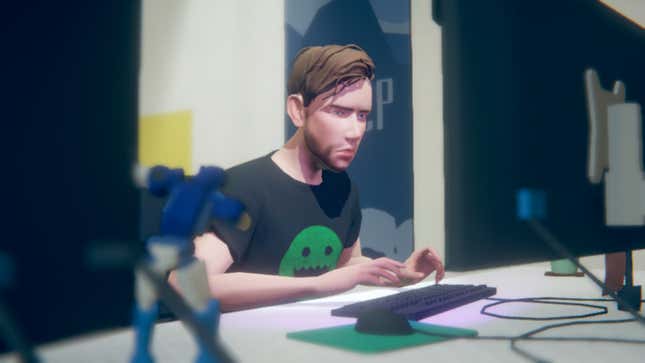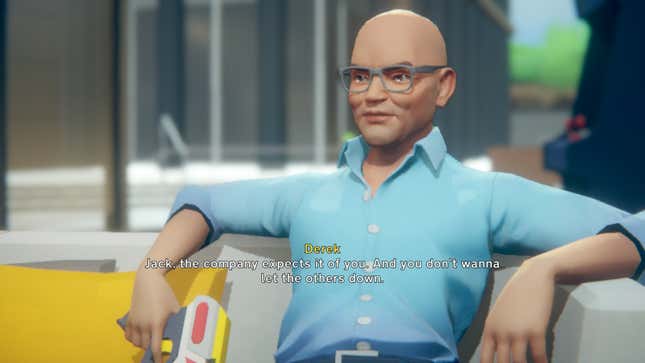
Last Stop, a narratively riveting if mechanically unengaging adventure game, comes out tomorrow for pretty much all of the platforms (and Game Pass). If you’re a fan of the genre, you’ll get a kick out of Last Stop, full stop. Getting into the weeds for a sec, I found myself impressed by how matter-of-factly this video game addresses crunch in video games.
Crunch, for those who don’t know, is a gaming industry term essentially meant to describe non-optional overtime. As Kotaku has extensively documented, crunch takes many forms. Sometimes it’s a directive. Other times, it seeps through a studio like an unseen gas; you see the person to the left of you coding ‘til 10:00 p.m., so you stay late, so the person to the right of you stays late, and so on. (Peer pressure is a powerful tool.) Sometimes it’s thankless. Other times you get paid—in money, in free food, in vacation time down the line. Deadline’s coming up. Game’s gotta get done, by any means necessary, even if it means the staff doesn’t get to see their families.
Read More: The Horrible World Of Video Game Crunch
Though public discussion around crunch has ramped up in recent years in the press and on social media, it’s still rare to see video games overtly address it directly. Last Stop does in one of its three interwoven plots, the Freaky Friday-inspired chapter called “Paper Dolls.”
Spoilers follow for Last Stop.

“Paper Dolls” stars a downtrodden middle-aged man named John. To John’s eternal consternation, his mail is regularly sent to a neighbor across the way, a fit young guy named Jack. At the end of the first chapter, John and Jack swap bodies. Jack may have a fancy flat ($2,735 a month for a one-bed!), but John’s got an eight-year-old daughter. You can see how life gets complicated.
Absent an easy cure, the duo have to passably perform each other’s daily responsibilities, including exercising, socializing, and all that boring work stuff. Jack is a team lead at a game development studio that “makes empathy games. It’s art really.” For John, a 40-something who’s shown early on having trouble with printer and who refers to one of the only video games he’s played as “the one with the maze?,” that’s a tall order.
In Jack’s body, John delegates tasks to Jack’s team in a weekly standup. Through dialogue options, you can attempt to figure out who’s doing what task, like coding an NPC’s AI (which John refers to as “IA”) and finalizing the art on background assets. I struck out on every one. Once you fumble your way through the meeting, you have a one-on-one with Jack’s manager, a stern yet sharply-dressed man named Derek, who tells John the game’s publisher is visiting in a few weeks.

“It’ll be a shit show,” Derek says. “I need you and your guys to crunch for the next few weeks. Obviously, we’ll take care of pizzas, takeaway—whatever you guys need.”
John, who’s spent 25 years at the same paper-pushing 9-to-5, is astonished by the concept, and asks if Derek means “overtime.”
“We’ll keep any seven day stints to a minimum, but if you could have your boys free up the next few weekends, that’d be great,” Derek says.
John tries to couch it. Between raising a kid, learning a new skill for an industry he has no experience in, and, y’know, inhabiting someone else’s body, who has the time? (In dialogue options, I opted to say I had plans.)
“Jack, the company expects it of you, and you don’t wanna let the others down,” Derek says.
John has the audacity to suggest a wild concept: that team members are paid extra money for the extra work.
“Overtime pay? You’re getting a little off message, Jack,” says Derek. “As a line manager, I need you to set an example.”
John is (rightfully) apoplectic at that.
“Don’t raise your voice to me,” Derek says. “I expect the team to pull together, to show some passion!”
Jack is fired on the spot.
Superficially, the scene has all the hallmarks of a crunch request: the free food, the social pressure, the six-day weeks that are framed as a breeze because they’re not seven days long, as they easily could be. But it’s the casual use of a single word, “passion,” that underscores Last Stop’s deep understanding of the root problem.
The gaming industry, like many others (including filmmaking, publishing, and beyond), is a prestige industry. Employers cash in on the passion of the individual. Bosses implicitly know staff will settle for dirt pay and clock ungodly hours, and count on that. You’re doing what you love, is the thought. You should be so lucky. Of course, everyone who works their asses off does so for different reasons, but many of those under-foot fires are fueled by a shared understanding that hundreds of people are lined up, ready to take your job in a heartbeat. You could be the most talented person in your discipline. You’re still eminently replaceable. It’s a fear shared by many folks in creative fields, and this scene validates it in a single word.
I haven’t played past this point of “Paper Dolls.” Last Stop, as mentioned, features three storylines, each six chapters long. You have to play each chronologically; to start the third chapter of “Domestic Affairs,” for instance, you’ll have to complete the second chapters of the other two stories first. “Paper Dolls” is portrayed as the lighthearted one, what with its inspiration drawn from a popular 2003 Disney comedy. But there’s still a marked maturity underlying the subject matter that has me gripped. I can’t wait to see what the rest holds.